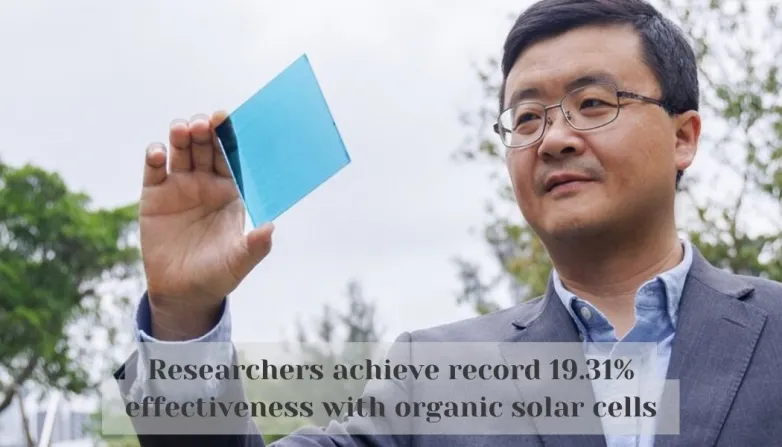Researchers achieve record 19.31% effectiveness with organic solar cells
- Researchers from The Hong Kong Polytechnic University (PolyU) have achieved a breakthrough power-conversion performance (PCE) of 19.31% with organic solar cells (OSCs), additionally referred to as polymer solar cells. This exceptional binary OSC effectiveness will certainly help enhance applications of these sophisticated solar energy devices.

The PCE, a procedure of the power created from a given solar irradiation, is thought about a significant criteria for the performance of photovoltaics (PVs), or photovoltaic panels, in power generation. The boosted effectiveness of more than 19% that was achieved by the PolyU researchers makes up a record for binary OSCs, which have one benefactor as well as one acceptor in the photo-active layer.
Led by Prof. Li Gang, Chair Professor of Energy Conversion Technology and also Sir Sze-Yen Chung Endowed Professor in Renewable Energy at PolyU, the study group developed a novel OSC morphology-regulating technique by using 1,3,5-trichlorobenzene as a crystallization regulator. This new technique enhances OSC performance and also stability.
The team developed a non-monotonic intermediated state manipulation (ISM) strategy to manipulate the bulk-heterojunction (BHJ) OSC morphology as well as all at once maximize the crystallization dynamics and energy loss of non-fullerene OSCs. Unlike the strategy of using typical solvent additives, which is based on extreme molecular aggregation in films, the ISM technique advertises the formation of more purchased molecular stacking and also desirable molecular aggregation. As a result, the PCE was considerably boosted as well as the unwanted non-radiative recombination loss was reduced. Significantly, non-radiative recombination reduces the light generation performance and also boosts the heat loss.
The research study group's searchings for are described in the study "19.3% Binary Organic Solar Cell and Low Non-Radiative Recombination Enabled by Non-Monotonic Intermediate State Transition" released in Nature Communications. The conversion of solar energy to power is an essential technology for achieving a sustainable environment. Although OSCs are appealing devices that harness solar energy cost-effectively, their performance has to be boosted if they are to be used commonly in practical applications.
Prof. Li claimed, "Challenges in research came from the existing additive-based benchmark morphology control methods, which suffer from non-radiative recombination loss, therefore decreasing the open-circuit voltage because of excessive aggregation." The research study team took about 2 years to devise a non-monotonic ISM approach for increasing the OSC effectiveness as well as decreasing the non-radiative recombination loss. The magazine of the research assures to galvanize OSC research study.
Prof. Li stated, "The new searching for will certainly make OSC research study an exciting field, and this will likely produce tremendous chances in applications like portable electronics as well as building-integrated PVs." The new door will open up when low cost single-junction OSCs can achieve a PCE of over 20%, along with even more stable performance and other unique benefits such as flexibility, openness, stretchability, reduced weight as well as tunable color.
Prof. Li has actually been recognized as a Highly Cited Researcher 9 years straight considering that 2014, which testifies to his significant effect on international research study. His introducing payments to research on polymer solar cells considering that 2005 have actually brought sustainable influence on printable solar energy development with international recognition.
Prof. Li said, "The most up to date research study shows a record low non-radiative recombination loss of 0.168 eV in a binary OSC with a PCE of over 19%. This is an extremely motivating outcome for the enduring research study on OSCs that I have performed over the past 20 years. We have already achieved far better OSC efficiency, as well as this will subsequently aid accelerate the applications of solar energy."
Also read

